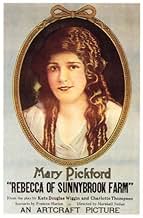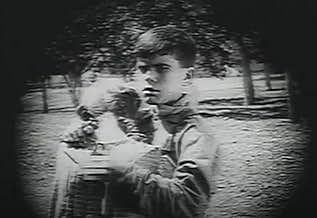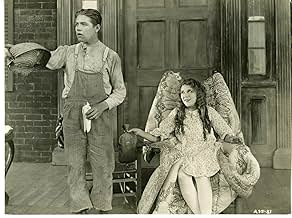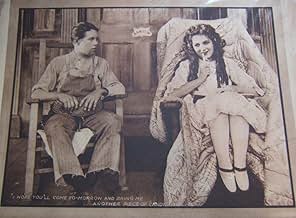With her family in financial difficulties, Rebecca is sent to live with her two strict, unfeeling aunts, who do not appreciate the young girl's charm and energy. Rebecca must make new friend... Read allWith her family in financial difficulties, Rebecca is sent to live with her two strict, unfeeling aunts, who do not appreciate the young girl's charm and energy. Rebecca must make new friends and adjust to surroundings that are sometimes difficult. But she still finds time to thi... Read allWith her family in financial difficulties, Rebecca is sent to live with her two strict, unfeeling aunts, who do not appreciate the young girl's charm and energy. Rebecca must make new friends and adjust to surroundings that are sometimes difficult. But she still finds time to think of numerous ways to help others in her new hometown.
- Director
- Writers
- Stars
- Mrs. Randall
- (as Jane Wolff)
- Mr. Simpson
- (as Frank Turner)
- Clara Belle Simpson
- (as Emma Gordes)
- School Boy
- (uncredited)
- …
- Bit Part
- (uncredited)
- Rebecca's Brother
- (uncredited)
- Undetermined Role
- (uncredited)
- Teenage Boy in Overalls
- (uncredited)
- Director
- Writers
- All cast & crew
- Production, box office & more at IMDbPro
Featured reviews
In a first class production, Pickford has some nice moments; though, her affected "little girl" persona doesn't really succeed in effectively portraying the young heroine of Kate Douglas Wiggins' "Rebecca of Sunnybrook Farm", as evidenced on film. In sometimes startling contrast, several of the other young performers are noticeably more natural and/or charming. Ms. Wilkey, one of the younger set, regrettably "retired" shortly after her convincing portrayal of "Minnie Smellie". Wilkey, who also played young "Flora" in "The Birth of a Nation" (1915), was one of many marvelous young players Pickford employed, to shine by her side. Happily, kids like Wesley Barry and Milton Berle did not retire after appearing herein.
******* Rebecca of Sunnybrook Farm (9/22/17) Marshall Neilan ~ Mary Pickford, Eugene O'Brien, Violet Wilkey, Helen Jerome Eddy
We're presented with a series of comic episodes in the life of poor young girl Rebecca Rowena Randall, sent to live with her well-to-do aunts and get a proper ejjication. She goes from selling Superba Soap door to door, reciting her unique poetry for Visitors Day at school to organising a Circus Parade and Show and then going to boarding school. On the way she manages to help various people in trouble in her own understated way and also falls in love and fixes on the man to marry - after she becomes a woman. The most violent scene is when Rebecca pulls Minnie Smellie's nose in class. With some lovely evocative olde worlde touches, especially in the storm scene we are eventually (horse) drawn to an appropriate sunbeam ending.
Most people would disdain to clap their modern eyes on this, but that's their loss. A nice little film to sink into every few years and ruminate on how the world has changed.
The film begins with Rebecca (Pickford playing someone about age 14) going to live with her two elderly aunts. It seems that Rebecca's family is having financial problems and the aunts have offered to take one of the children in and adopt them--and the one turns out to be Rebecca. What follows is no real consistent theme--just a variety of incidents. Some involve Rebecca fighting with some stuck up girls at school, some with her attempts to help a local poor family and a very few involve Rebecca and her aunts. However, there really isn't much of a theme or purpose to all this. SOME attempt is made with the introduction of the Mr. Ladd character, but this is also very under-developed and a bit creepy. See the film and you'll understand about the whole 'creepy' angle. Overall, a film that left me surprisingly cold considering that I like Pickford's films...just not this one. Now I am not saying it's bad--just not nearly as good as her typical 'little girl' film.
By the way, if you want something other than these sorts of portrayals by Pickford, try finding a copy of "My Best Girl"-- probably her best film and one of the great silents.
At times, it's disconcerting to see Pickford play a young teen because for all the prancing,pouting and curl tossing, Mary is clearly an adult woman. Even creepier is the abject attention this little girl is receiving from the village's most eligible bachelor, but I guess back even in 1917 people wanted to see a love story. Still, the film is an old fashioned pleasure, with many charming gags and characters, and over much too soon.
Zukor believed in signing the top movie stars in the business. One of his first contracts was with Hollywood's most popular actress, Mary Pickford. Her signature on the dotted line on June 24, 1916, was the first million dollar pact for an female performer. Zukor was willing to pay her $10,000 a week and to give her half the profits for each film she made. He guaranteed over one million dollars (about $20 million in today's inflationary dollars) for the year with her full control of each of her film's production, an unprecedented contract at that time.
So impressed was Zukor with Frances Marion's script of "The Poor Little Rich Girl" he took the unusual step of paying her $50,000 per year to be Pickford's official scenarioist, making her one of the highest paid writers in the business. Marion wrote two other scripts for her in 1917, both becoming instant classics.
For her second Pickford screenplay, Marion took the 1903 Kate Wiggin's children novel, "Rebecca of Sunnybrook Farm" and the 1909 play of the same name and adapted it to fit Pickford's magnetic personality. The September 1917 movie contains a series of vignettes of Pickford playing a young niece who is harbored by two aunts, one cranky and the other laid back She's harped on because of her confident independence, except for a one loyal friend and a rich young man who has eyes out for the adolescent Rebecca. Innocent romance develops between the two in this feel-good motion picture which the members of the American Film Institute nominated as one of 500 films to be considered for its "Top 100 Funniest Movies."
Did you know
- TriviaThis was Milton Berle's first film.
- Quotes
Title Card: Aunt Miranda Sawyer, of Riverboro, has a Heart Which she Uses for no other Purpose Than the Pumping and Circulation of Blood.
- ConnectionsEdited into American Experience: Mary Pickford (2005)
Details
- Release date
- Country of origin
- Languages
- Also known as
- Rebecka från Sunnybrookfarmen
- Filming locations
- Production company
- See more company credits at IMDbPro
- Runtime
- 1h 18m(78 min)
- Color
- Sound mix
- Aspect ratio
- 1.33 : 1






































